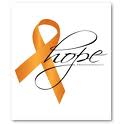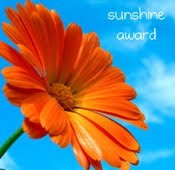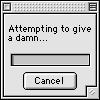Such is the discombobulation factor of Spring Break that I realized today that yesterday was not Friday. Last night when I Flogged My Blog via MummyTime, it was, in fact, Friday over in Australia, which is where she lives. But not here. And so I flogged yesterday's post, which is probably better anyway because today's is more likely to be much in line with the posts of Monday and Tuesday and Wednesday which were less than thrilling.
Yesterday at least I had a poem. Which made some people happy and others probably not so much, since some of my lovely followers get the happies when I post poetry and others groan and sink their heads into their hands, wondering why I persist in putting my nonprosical, uncapitalized, unpunctuated whatnots up on this blog.
Oooh, you should see all the red squiggly underlining Blogger is throwing at me. THOSE ARE NOT REAL WORDS! it says, huffing about and glaring at me through all its little 1s and 0s*. It doesn't understand the concept of linguistic creativity, of creating nonwords from words and suffixes and prefixes, of conveying meaning in ways not contained by Standard English.
I am a teacher of English, yes. I instruct my students in the use of Standard English for formal and academic use. However, in my own nonformal, nonacademic writing, I find myself quasi-following the footsteps of e. e. cummings and Lewis Carroll. I love doing this. I love the playfulness of language, how meaning can be conveyed through context and the bits and pieces of recognizable vocabulary, how it changes and evolves and lives. Language is a living entity, affected by and affecting its users, its speakers and writers and creators and creations. For we are as created by the language we speak as we are its creators: our identities are shaped by the words we use to describe ourselves and others, by the words we choose in our different contexts, by the dialects and codes that mark us as members of this and that community.
My students mock me gently (and sometimes not so gently) for the use of words/phrases like y'all and all y'all. I smile and tell them it marks my history as the classmate of Texans in the long ago of my youth, a trace that lives to this day. I listen to the verbs used by my friends and family: the dialect transformation of wash to warsh by my grandmother, a friend's modification of I saw to I seen. I listen to The Widget's experimentation with syntax: his declaration that I want all by myself walk!
Look at the transformation of language by the wave of Internet communication today. Our language is changing at a speed and in ways that we've never seen before in the history of the English language. Just look at my own blog: I use webspeak like cuz and lol and Intarwebz and blogosphere....the list goes on, and I only touch the tip of what is used these days. Consider the new verb google. Just like Kleenex and Xerox back in the day, Google is now something one does. I google information all the time. Don't you?
Not all of this is marvelous. I cannot express my disgust when papers are turned in using webspeak. I cross such words out with massive, heavy marks of the pen and let my students know just how unacceptable this is. How long will this last, however? Already words that were the unacceptable slang of the Long Ago are acceptable now: cool, gay, yeah, slick...Check out the complete Webster's Dictionary--the latest edition, because they add new words every year. Oh yes. That copy that's been sitting in the bookshelf for a few decades is outdated. Chances are you'll find words in there that are no longer in regular use, and it will be missing countless words that have crept into the center of our language since.
We (technically) still speak Modern English, just as Shakespeare did. Oh yes. Didn't you know that? From the point of view of the linguistic eras, the language we speak today is the same as his. Tell my students that, however, and I receive disbelieving stares. It is true that, with some concentration, one can read Shakespeare and discern the meaning. Most of the words are still in the dictionary. For that matter, Shakespeare coined many a word and phrase for the English language.
But no, we do not speak, from a realistic and practical point of view, the identical language as Shakespeare or Benjamin Franklin or Lewis Carroll or Edgar Allan Poe. We have a different body of words, and even old words have often shifted meaning. The skeletal structure remains, but the flesh has changed.
How dull if language remained static. Life is not static. Life changes and grows and morphs and diverges. How lovely that language does as well.
And what do you know: I had something to say today after all!
-------------------------------------------------
*This is a reference to binary code for the uninitiated into the confusing world of computer code. Keep in mind, I'm clueless about how this all works, but have been around so many computer geeks for so very many years that I can't help but pick up a few things here and there.
11 years ago

































9 bits of love:
Odd that you would love language, living breathing language . . . one would think you might be that 3-year-old who used to sit by me writing her own set of vocabulary cards, or the 6th-grader who wrote a dictionary for a language she was making up for fun during her vacation . . . or that you are my daughter!
The problem isn’t that people use many of the words that you listed, but that they limit themselves to those words. My outdated unabridged dictionary of the English language is HUGE, weighs 27pounds, contains a multitude of entries, and represents the 99% of the English language that doesn’t get used. That is unequivocally, unmistakably, and unquestionably unfortunate.
And when I think about flogging something, I usually don’t have my blog in mind.
Just sayin’.
Lovely to read something that isn't angst or poetry (or angst IN poetry).
Love your analysis!
And complete sentences are so passé because.
You know, Lauren--WHATEVER. :P
I'll have you know I looked back over my last month's posts and there really isn't much that's angsty there! And only a little bit of poetry! There were even amusing posts about SHOES!
*sigh* Some people are just never happy.
I love whatever you write.
Working in the Hamtramck High school cafeteria, I hear a lot more language than I would prefer to hear. Not to mention all the other languages that are spoken in our schools. I believe we have about 30 different nationalities attending our district so it can get rather interesting!
Did you really write your own dictionary during nacation? LOL! I love it! (((HUGS)))
Please refrain from speaking to me in binary code. Or C+ C++ HTML XHTML CSS or anything of the like. I get enough of that at home, thanks.
A thought provoking blog! Thanks!
It's funny how small groups of people develop their own language, too. Like MuttonChops Hubby and one of his good friends from Philly - they have their own lexicon, that I find myself using! They use completely mangled words, mind you, but so appropriate sometimes! And consequently MCH and I develop our own lexicon, to the point where my mother-in-law claims she can't understand the conversations MCH and I have between the 2 of us. So does that mean Little Z will learn a vocabulary that's not "right?" Will his friends then be using these "false" words, consequently changing English in his peer group, or will his kindergarten teacher break him of the habit with humiliation when he finds out half of his vocabulary is made up???
Love,
SoccerSister
I'm new to the blog-really enjoy it. Great take on the changing nature of language. I remember being taught that you shouldn't start a sentence with "and" or "but." Now that rule seems as dated as vinyl records.
i love it when toddlers start stretching their language abilities. it's like they are learning english as a second language. it's so freaking cute. last night when i picked the kids up, my daughter was like, "i put-a my boots on. i need the help." how can you not laugh?
Post a Comment